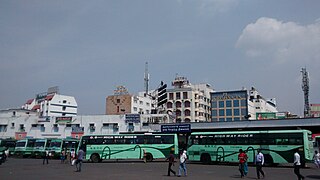
Business is the activity of making one's living or making money by producing or buying and selling products. Simply put, it is "any activity or enterprise entered into for profit. It does not mean it is a company, a corporation, partnership, or have any such formal organization, but it can range from a street peddler to General Motors."

The Corporation for Public Broadcasting (CPB) is an American non-profit corporation created in 1967 by an act of the United States Congress and funded by the federal government to promote and help support public broadcasting. The corporation's mission is to ensure universal access to non-commercial, high-quality content and telecommunications services. It does so by distributing more than 70 percent of its funding to more than 1,400 locally owned public radio and television stations.
The Canadian Broadcasting Corporation, branded as CBC/Radio-Canada, is a Canadian federal Crown corporation that serves as the national public broadcaster for both radio and television. The English- and French-language service units of the corporation are commonly known as CBC and Radio-Canada, respectively.
A nonprofit organization (NPO), also known as a non-business entity, not-for-profit organization, or nonprofit institution, is an organization dedicated to furthering a particular social cause or advocating for a shared point of view. In economic terms, it is an organization using its surplus of the revenues to further achieve its ultimate objective, rather than distributing its income to the organization's shareholders, leaders, or members. Nonprofits are tax-exempt or charitable, meaning they do not pay income tax on the money that they receive for their organization. They can operate in religious, scientific, research, or educational settings.
Public broadcasting involves radio, television and other electronic-media outlets whose primary mission is public service. In many countries of the world, funding comes from governments, especially via annual fees charged on receivers. In the United States, public broadcasters may receive some funding from both federal and state sources, but generally most of their financial support comes from underwriting by foundations and businesses, along with audience contributions via pledge drives. The great majority operate as private not-for-profit corporations.
A state-owned enterprise (SOE) is a business enterprise where the government or state has significant control through full, majority, or significant minority ownership. Defining characteristics of SOEs are their distinct legal form and operation in commercial affairs and activities. While they may also have public policy objectives, SOEs should be differentiated from government agencies or state entities established to pursue purely nonfinancial objectives.
There are two types of radio network currently in use around the world: the one-to-many broadcast network commonly used for public information and mass-media entertainment, and the two-way radio type used more commonly for public safety and public services such as police, fire, taxicabs, and delivery services. Cell phones are able to send and receive simultaneously by using two different frequencies at the same time. Many of the same components and much of the same basic technology applies to all three.

A public company, publicly traded company, publicly held company, publicly listed company, or public limited company is a company whose ownership is organized via shares of stock which are intended to be freely traded on a stock exchange or in over-the-counter markets. A public company can be listed on a stock exchange, which facilitates the trade of shares, or not. In some jurisdictions, public companies over a certain size must be listed on an exchange.

Public finance is the study of the role of the government in the economy. It is the branch of economics that assesses the government revenue and government expenditure of the public authorities and the adjustment of one or the other to achieve desirable effects and avoid undesirable ones.
Corporatization is the process of transforming state assets, government agencies, or municipal organizations into corporations. It refers to a restructuring of government and public organizations into their administration. The result of corporatization is the creation of state-owned corporations where the government retains a majority ownership of the corporation's stock.

Computer Sciences Corporation (CSC) was an American multinational corporation that provided information technology (IT) services and professional services. On April 3, 2017, it merged with the Enterprise Services line of business of HP Enterprise to create DXC Technology.
Public service is a service intended to serve all members of a community. It is usually provided by government to people living within its jurisdiction, either directly or by financing provision of services. The term is associated with a social consensus that certain services should be available to all, regardless of income, physical ability or mental acuity. Even where public services are neither publicly provided nor publicly financed, for social and political reasons they are usually subject to regulation going beyond that applying to most economic sectors. Public policy when made in the public's interest and motivations can provide public services. Public service is also a course that can be studied at a college or university. Examples of public services are the fire brigade, police, air force, and paramedics.

A privately held company, private company, or close corporation is a business company owned either by non-governmental organizations or by a relatively small number of shareholders or company members which does not offer or trade its company stock (shares) to the general public on the stock market exchanges, but rather the company's stock is offered, owned and traded or exchanged privately or over-the-counter. More ambiguous terms for a privately held company are closely held corporation, unquoted company, and unlisted company.
A municipal corporation is the legal term for a local governing body, including cities, counties, towns, townships, charter townships, villages, and boroughs. The term can also be used to describe municipally owned corporations.

The Shipping Corporation of India (SCI) is a Government of India Public Sector Enterprise with its headquarters in Mumbai that operates and manages vessels that services both national and international lines.

The Ahmedabad Municipal Corporation, or the AMC, established in July 1950 under the Bombay Provincial Corporation Act (1949), is responsible for the civic infrastructure and administration of the city of Ahmedabad.

Tamil Nadu State Transport Corporation Limited (TNSTC) is a public transport bus operator in Tamil Nadu, India. It operates Intercity bus services to cities within Tamil Nadu, and from Tamil Nadu to its neighbouring states with a combined fleet strength of 21678..It also operates Public transport bus service in many cities of Tamil Nadu, with the exception of Chennai, where the public bus service is operated by MTC, a subsidiary of TNSTC.
A statutory corporation is a corporation created by the state. Their precise nature varies by jurisdiction, thus, they might be ordinary companies/corporations owned by a government with or without other shareholders, or they might be a body without shareholders that is controlled by national or sub-national government to the extent provided for in the creating legislation.

A municipal corporation, city corporation, Mahanagar Palika, Mahanagar Nigam or Nagar Nigam or Nagara Sabha is a local government in India that administers urban areas with a population of more than one million. The growing population and urbanization in various cities of India were in need of a local governing body that can work for providing necessary community services like health care, educational institution, housing, transport etc. by collecting property tax and fixed grant from the State Government.

The Public Broadcasting Service (PBS) is an American public broadcaster and television program distributor. It is a nonprofit organization and the most prominent provider of educational television programming to public television stations in the United States, distributing series such as American Experience, America's Test Kitchen, Antiques Roadshow, Arthur, Barney & Friends, Clifford the Big Red Dog, Downton Abbey, Finding Your Roots, Frontline, The Magic School Bus, Masterpiece, Mister Rogers' Neighborhood, Nature, Nova, the PBS NewsHour, Sesame Street, Teletubbies, and This Old House.









